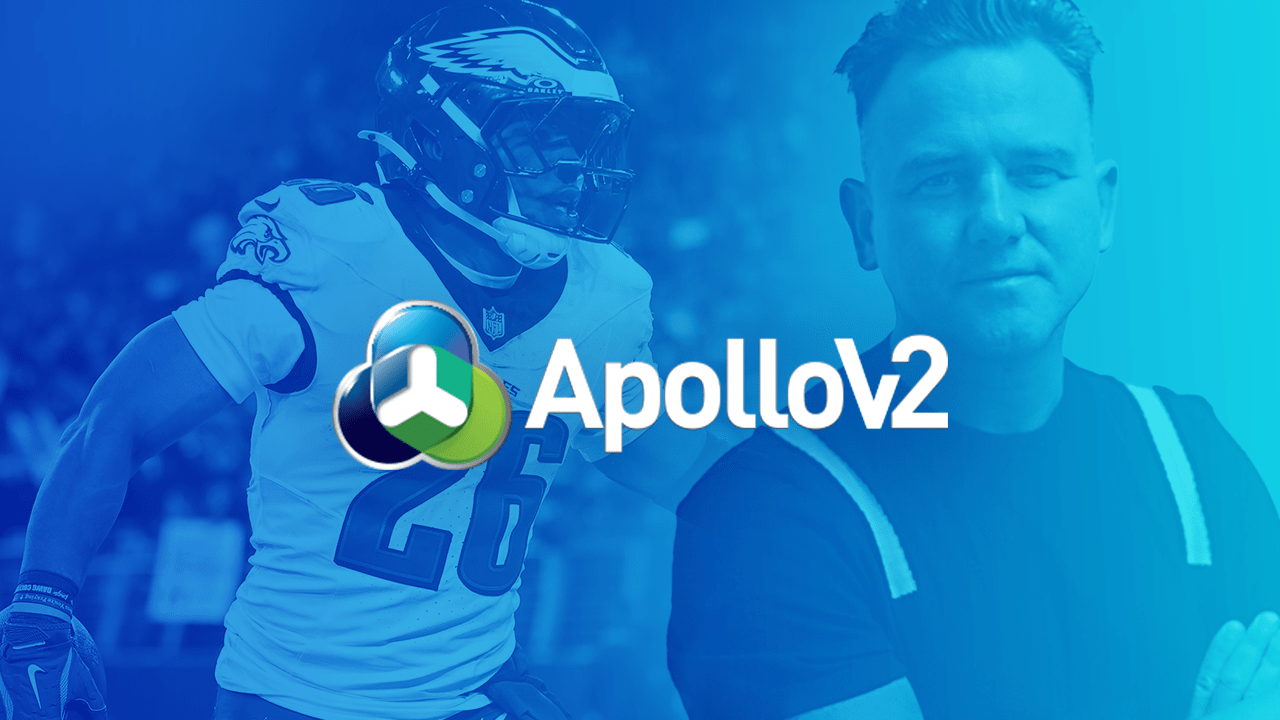
Saquon Barkley was two years removed from ACL surgery—and a few months recovered from a left ankle sprain—when, in May 2022, he reached out to Dave Hancock for help.
The founder and CEO of health data platform ApolloV2, Hancock has a master’s degree in sports medicine and exercise physiology and has worked with some of the world’s most prominent athletes and celebrities on their rehab. In 2019, for example, he spent four months living with Kevin Durant as he returned from a ruptured Achilles tendon. He’s also worked on David Beckham, Madonna, Odell Beckham Jr. and James Bond actor Daniel Craig.
Often injured and nearing the end of his rookie deal with the New York Giants, Barkley connected with Hancock through another NFL player—Hancock wouldn’t say who—and invited him to his house in New Jersey. The first thing they did, Hancock says, is what he calls a ‘movement screening.’ Over the course of about an hour, Hancock put the 6-foot, 233-pound running back through an avalanche of small tests, including movement patterns and rotational exercises at various speeds. Almost immediately, a handful of minor weaknesses and restrictions became apparent.
“There were a number of tests where he couldn’t believe he was so weak,” Hancock said. “He kept saying, ‘Do it again. Do it again.’ We did some three or four times. He couldn’t believe that I’d found these things—you know, he’s built like the Hulk.”
Hancock, who declined to share specifics about Barkley’s results, gave the running back a program to incorporate into the rest of his strength, stretching and pregame routines. The ApolloV2 team checked in with Barkley a few times a week, and that season, Barkley set personal bests in yards (1,312) and carries (295), playing all 16 games for the first time since he was a rookie.
Those personal bests stood just two years. This season, his first with the Philadelphia Eagles, Barkley rushed for 2,005 yards on 345 carries, both tops in the NFL. The Eagles and Barkley, whose agent didn’t respond to an interview request this week, host the Packers at 4:30 p.m. ET Sunday in the first round of the NFL playoffs.
“You always hear, ‘Oh this athlete is just unlucky.’ No, the athlete’s not just unlucky,” Hancock said of a common misconception regarding injuries. “I started seeing trends—so you see one guy who never got injured, he gets one injury, then another and another. Every team, every organization sees these athletes. And it all boils down to this dysfunctional patterning in how the body moves, because at the end of the day, an athlete’s body has to move fast, and it has to stop fast.”
ApolloV2 is, as the name implies, the second version of the company. Hancock launched the original Apollo in Leeds, England, back in 2007 alongside Prozone founder Ramm Mylvaganam. Apollo helped sports teams centralize and interpret data, but as Hancock recalls, was run “like a mom and pop shop” with one major client, Manchester United.
Hancock earned his master’s degree from the University of Nottingham in 2000, and was working at the time as the the lead physiotherapist for a number of prominent sports teams—Leeds United until 2006, Chelsea until 2008, the New York Knicks until 2014. His work on the sidelines was his main priority.
When he left the Knicks, however, Hancock says he began thinking more intently about Apollo’s technology, his expertise, and the struggles of many teams to adapt to the idea that every athlete is unique in how he/she moves, bears weight, handles stress and recovers. Though the field was getting crowded with other companies and his original product was now antiquated, Hancock felt there was still plenty of room for innovation. And a big business opportunity, both for his company and for his clients.
“Look at how athletes are produced,” he said. “In English football, or soccer, they’re worth an incredible amount of money. If you produce a home-grown talent, they’re worth tens of millions of dollars.”
ApolloV2 formally relaunched about five years ago with a handful of investors and advisors, including Bruin Capital’s George Pyne, who serves on the board, and former Madison Square Garden CTO Sean O’Donoghue, an advisor. (Hancock declined to comment on how much the company has raised, or its financials, outside of saying revenue jumped 40% in the past year).
The company takes data that teams collect through myriad means—fitness tests, Whoop bands, Oura rings, game data—then layers in some of its own measurements, like the movement test that Barkley first took back in May 2022. Each client has a custom interface that allows it to better evaluate and treat each of its athletes, utilizing insight from Hancock and AI analysis.
The data that comes from ApolloV2 clients is owned by the team/organization, and is not used with other clients, Hancock said. It’s not even used to train the company’s AI initiatives. The company does, however, scrape public data for improving its product. ApolloV2 owns AthleteGameLost, a data platform that tracks public injury information across many different sports.
Today, ApolloV2 has roughly two dozen employees, with offices in New York and England, along with a satellite in Los Angeles. The company works with more than 100 sports teams of various sizes, including some of the world’s most prominent—Manchester United, Alabama’s football team, USA Softball and the University of Southern California athletic department. Its product typically costs $60,000 to $100,000 per year, though it varies by partner.
Hancock says he doesn’t spend too much time watching athletes he’s worked with—”my son typically tells me how well they’re doing”—but he will be watching Sunday when Barkley and the Eagles play the Packers.
“To be really honest, I don’t always have the time to keep track,” he said, “but the relationships I’ve built with athletes, and the ability to help them if they need it, that gives me great satisfaction.”

